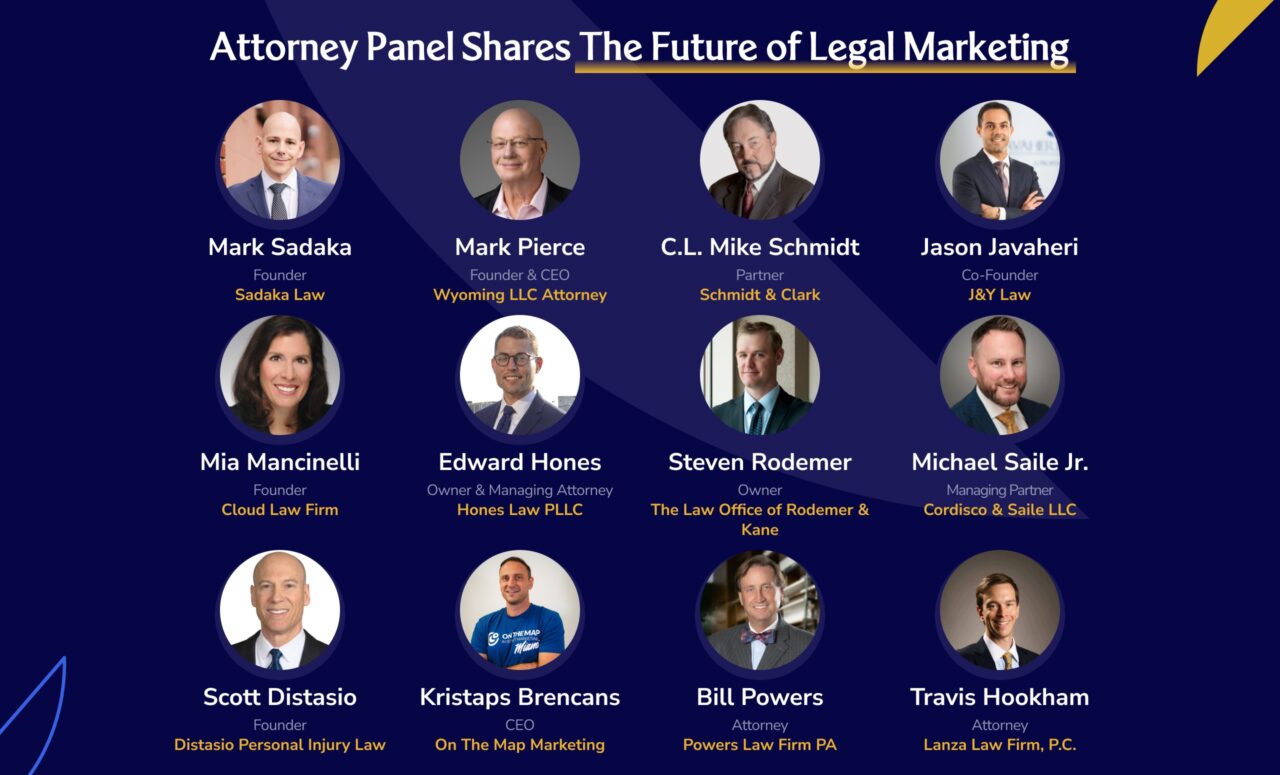Future of Legal Marketing: 8 Trends For 2025
The legal industry is fast-changing—and so is legal marketing.
In this post, we compiled the biggest trends that will shape the future of legal marketing in 2025.
From AI adoption to word-of-mouth or traditional law firm marketing reimagined, here’s what seasoned lawyers envision:

1. AI to Take On a Bigger Role in the Legal Industry
In recent years, more and more lawyers are beginning to understand the impact of AI on the legal industry.
According to the 2024 State of AI in Legal by Litify, the number of lawyers who use AI has doubled from last year.

Wondering how lawyers actually apply AI in their practice?
Mark Sadaka, founder of Sadaka Law, says this:

The future of legal marketing is all about combining digital innovation, data-driven decisions, and building real relationships with clients
With AI on the rise, we’re also seeing more automation in lead generation and client communications, so it’s important to strike a balance between tech efficiency and real client connection.

It’s true that legal marketing automation is possible without AI running the show. But AI technologies like machine learning and natural language processing make a ton of difference in terms of flexibility and results.
Early adopters like Wyoming LLC Attorney founder Mark Pierce get tremendous results with AI:

Another rising trend is the utilization of AI and predictive analytics to pinpoint potential clients. Early adoption of this technology has saved my firm a considerable amount in ad spend and resulted in a 20% higher conversion rate.

With AI’s proven track record, C.L. Mike Schmidt, partner at Schmidt & Clark, is one of the forward-thinking lawyers planning to use AI in the foreseeable future:

Another trend is the growing use of AI and automation in legal marketing. These technologies can help streamline tasks like client intake, document management, and even marketing campaigns, allowing us to focus more on providing excellent legal services.
I also intend to invest in AI and automation tools to improve efficiency and client satisfaction.

2. More Lawyers Will Use Video Marketing to Connect with Modern Audiences
With YouTube lawyers like Devin Stone from LegalEagle and Jarrett Stone from Law Venture leading the way, more attorneys are jumping into the video marketing trend to elevate their online presence.
Jason Javaheri, co-founder of J&Y Law, is one of the lawyers who also use video content to raise brand awareness and win their target audience’s trust:

Video will be a huge focus, with more resources allocated to YouTube, Instagram Reels, and potentially even TikTok, as these platforms allow us to build trust through relatable content. By offering clear, straightforward answers to common legal questions, we connect with people who may feel overwhelmed by the idea of hiring an attorney. Ultimately, video humanizes our practice, showing clients that we are approachable and dedicated.

Regarding their budget allocation, Javaheri attests that their firm is getting exponential returns.
“By reallocating 25% of our marketing budget to video content, our engagement on platforms like YouTube and Facebook has more than doubled, with a 50% increase in video views across educational content,” says Javaheri.
As far as video content goes, Sadaka Law founder Mark Sadaka firmly believes that it’s among the best ways to connect with potential clients with little to no understanding of legal processes:

For Sadaka Law, we plan to spend our marketing budget on strategies that build trust and authority, like content marketing and educational videos. We’ve found that clients really appreciate resources that make complex legal topics easier to understand. That’s why we’re putting more focus on videos, webinars, and blogs to help clients feel informed before they even step into our office. Short-form video, especially on platforms like YouTube and Instagram, is becoming a top priority because it lets us connect more personally with clients where they’re already engaged.

Mia Mancinelli Cloud, founder of Cloud Law Firm, echoes Sadaka’s sentiment—thanks to the results video marketing has generated for her firm.
She also talks about her go-to marketing channels for distributing video content:

Video has already proved great for engagement. Even more, clients have reached out to us after watching our informative videos. We will be targeting an increase in our budget on digital content while improving our video presence, especially on YouTube and LinkedIn.

3. SEO Remains a Priority with Fine-Tuning
Take note that video is just one part of the broader legal content marketing umbrella.
Another aspect of content marketing is SEO, which allows your blog posts, case studies, and other website resources to generate organic traffic.
Mark Pierce believes that SEO and social media will play a major role in his firm’s growth, taking up a good portion of their marketing budget coming into 2025:

Social media and SEO are significantly influencing decision-making, and by 2025, I predict they will be principal platforms for legal marketing. For instance, my firm allocates approximately 35% of our marketing budget to these mediums, which has resulted in a 25% increase in client engagement in the past two years.

Edward Hones, owner and managing attorney at Hones Law Employment Lawyers PLLC, also sees continued gains through SEO using fundamental tactics, like publishing high-quality content that align with their target audience:

As more people turn to online platforms for information and resources, it’s essential for law firms like ours to embrace content-marketing strategies that not only showcase our expertise in employment law but also resonate with our target audience’s values.
I anticipate investing heavily in SEO and targeted social media advertising. Data shows that organic search traffic to our website has increased by over 30% in the past year, directly correlating with our focused SEO efforts.

There are plenty of data that support SEO’s growing significance in the legal space. However, modern SEO puts more emphasis on user-centric content and local search optimization.
Steven Rodemer, owner of The Law Office of Rodemer & Kane, elaborates on the importance of creating helpful content and adopting a multi-format strategy:

In criminal defense work, SEO and paid search are indispensable for visibility where potential clients are often in urgent need of legal help.
Other forms of investment include content development, either in the form of a video or a blog post, and helping to build a profile for demonstrating expertise and interacting more meaningfully with clients.

In terms of local SEO, law firms need to widen their approach
Mia Mancinelli Cloud cites that optimizing Google Business Profile is and will be a focal point in their strategy:

The big challenge next is maintaining a cutting-edge above the competition as other companies implement digital-marketing strategies. The new clients we have gotten are a result of local SEO. We will keep optimizing our Google Business Profile and continually create more positive reviews.

C.L. Mike Schmidt also acknowledges the importance of SEO for reaching the modern audience:

One of the biggest trends I see is the increasing importance of digital marketing. With more potential clients turning to the Internet to find legal services, law firms must have a strong online presence. This means investing in SEO, content marketing, and social media to reach a wider audience.

4. Social Media Marketing As a Supporting Strategy
Quick fact: Social media is second only to TV ads (and tied with Google Business Profile optimization) as the most effective channel for raising brand awareness—according to the 2023 Marketing Outlook for Law Firms.

Today, most lawyers use social media as a supporting strategy for other marketing projects.
For one, social media platforms like Facebook, Instagram, and LinkedIn are perfect for spreading educational video content that can lift your authority in the legal space.
Michael Saile Jr., managing partner at Cordisco & Saile LLC, says:

Social media marketing, particularly LinkedIn and educational video content, has proven especially effective, delivering a 30% higher client engagement rate than traditional advertising. I recall how our investment in creating valuable educational content led to an increase in consultation requests from well-informed potential clients.

5. Digital PR and Brand Building are Still Pillars of Marketing Success
While SEO, video marketing, and social media work together to generate interest, most lawyers shift their focus to reputation management to seal the deal.
According to the Local Consumer Survey 2024 by BrightLocal, 69% of people are more likely to choose a business that exemplifies good reputation management practices. This can be reflected in the way they handle and respond to reviews—both the good and the bad.

Here’s what Scott Distasio, founder of Distasio Personal Injury Law, has to say:

Beyond marketing channels, law firms’ reputation management becomes vital, reinforcing our commitment to ethical practice and client well-being. In my own firm, a focus on ‘Distasio Personal Touch’ has led to boosted client satisfaction rates and increased referrals; a testament to the efficacy of combining cutting-edge marketing strategies with good old-fashioned relationship building.

Your brand helps distinguish what services or industries you specialize in, It allows you to differentiate your practice from others in the industry and, in the process, attract the right leads.
Branding for your law firm can be tricky because you must align your brand with your employees’ collective experience, values, and culture. But it’s essential to get your law firm office in harmony with your messaging if you want to make the most out of your legal marketing.
Building a reputable brand is also proven to benefit your SEO efforts.
On The Map Marketing CEO, Kristaps Brencans says:

A smart SEO once told me, “Google wants to rank brands that are known in real life.”
People actually use and review their services. Customers are actively looking for them online. They’re recognized among peers and active in the community.
When it comes to quality search results, ranking well-established brands tends to offer a better user experience.

6. Traditional Marketing and Referral Tactics to Remain Relevant
Despite the rapid digitization of legal marketing, plenty of lawyers continue to see success with traditional marketing strategies—including referral marketing.
Bill Powers of Powers Law Firm PA states that focusing on referral marketing can be a difference-maker in a digitally-driven world:

The path to truly profitable legal marketing lies in authentic relationships with seasoned Gen-X and Boomer attorneys who can become powerful referral sources. While everyone else floods social media with minimal ROI, ambitious lawyers can stand out by going old-school—writing personal notes, making calls, and showing up at CLE events and bar gatherings where real connections happen. The strategy is simple but demands life’s most valuable asset: time.

Some lawyers like Travis Hookham from Lanza Law Firm, P.C., like to keep their strategy grounded on time-tested, traditional marketing tactics—namely referral marketing:

We have seen the rise of social media over the past few years as the platform de jour, be it TikTok, Instagram, Facebook, or others. However, for our firm’s practice area, the real marketing field is one as old as time: word of mouth. Sure, it helps to have a social media presence, but there is nothing that beats your local reputation. For me, this means that how you behave in court (and via motion practice) affects your reputation, which affects your “brand.”

Finally, it’s worth mentioning that even forward-thinking lawyers like Scott Distasio still invest heavily in traditional marketing channels despite having a mixed, omnichannel approach:

My firm has experienced success with a hybrid approach; allocating approximately 30% of our budget to digital marketing efforts. This includes SEO, social media advertising, and informative content released on our blog and video channels. We’ve seen an upward trend in audience engagement here and a positive impact on new client acquisitions. The remaining 70% is invested in traditional outreach means, such as community initiatives, TV ads, and networking events, to maintain strong local connections.

Final Thoughts
Lawyers live in a fast-paced, highly competitive world where it pays to innovate and act fast.
“From 2025 forward, technological advancement, in conjunction with a deeper connection with clients, will be the hallmark of future legal marketing,” says Mia Mancinelli Cloud.
If you’re looking to expand your marketing endeavors, your best bet is to work with an agency with a proven track record of success in the legal industry. Contact us here and request your free marketing audit today!
Table of Contents
Related Articles
Dominate Your Market with Digital Marketing Services That Deliver
Talk to a certified professional today, and we will design a strategy specific to your case.







